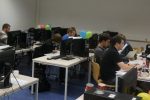 04.06.2016 |
Within the scope of the "Approaching Programming Contests" practical, five student teams from Johannes Gutenberg University participated in the German Collegiate Programming Contest (GCPC 2016). Team JOGUrt (picture, right) earned an excellent 14th place (of 96). |
The Training Sessions
In the "Approaching Programming Contests" practical, students can tackle interesting problems that could be or have been part of a programming contest. It aims at students who have completed introductory courses such as "Introduction to Programming" and "Data Structures and Efficient Algorithms". While the focus in the latter lies on the asymptotic runtime analysis of algorithms, students have to consider practical aspects in the APC sessions: An efficient algorithm may be more difficult to implement, and its merits could become significant only for problem sizes that are far beyond the task's requirements. However, often a naive algorithm is too slow for the given time limit.
Typical tasks include finding shortest paths in networks, computing maximum flows, counting the number of possible solutions to a problem, and geometrical calculations.
The Contest
In the German Collegiate Programming Contest (GCPC) on June 04th, 96 student teams from 16 German universities competed in a five-hour contest which consisted of twelve problems. The participants wrote their program code at the home institution and submitted it to a server, which was provided by the Technical University of Munich. The server then tested the programs with input data and reported whether all solutions were correct and the time limit was not exceeded. For every problem solved, a team received a balloon in the problem color. The teams could see the overall rankings during the contest except for the last hour, which put further pressure on them. The problem set can be found at the GCPC 2016 site.
The best team from Mainz was JOGUrt, which consisted of the GCPC veterans David Auer, Daniel Franzen, and Thomas Hadler. They earned place 14 of 96 with 7 problems solved (last year: 9th of 62, 5 of 11 problems solved).
The other four teams were The Pinky (39th, 4 problems), eXception Happens (67th, 3 problems), Alaska Selax (70th, 3 problems), and Update (90th, 1 problem), who all competed for the first time.
Some students expressed interest in participating in the Northwestern European Programming Contest (NWERC), which will be held November 19-20th, 2016 in Bath, UK. Students interested in APC practicals and programming contests can contact Markus Blumenstock for further information.
Special thanks go to Domenico Mosca for help with the local organization, Stefan Toman et al. from TU Munich for organizing the GCPC, and all judges of the GCPC for providing challenging problems.
Markus Blumenstock
